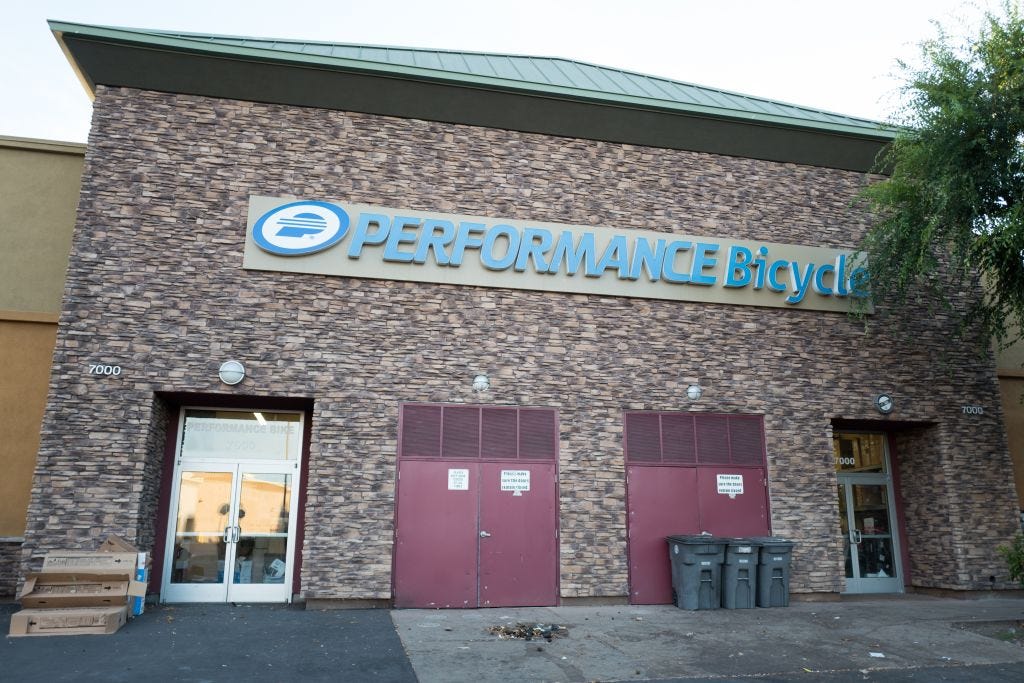When I worked in bike shops, friends and family members couldn’t understand how I made so little money when bikes cost so much.
Mind you, that was when few bikes had four-figure price tags, let alone the five-figure tags attached to some of today’s machines.
I would try to explain that small local shops didn’t make much profit—and, as often as not, none at all on bikes themselves, especially high-end bikes. For one thing, it’s expensive to run a shop: To do it, you need a lot of space, which is pricey in any good location for a shop. Then, a shop needs fixtures specifically for displaying and working on bikes, as well as tools and machines. And a shop owner has to pay to keep the lights on—and keep the tax authorities happy.*
On top of all of that, the shop has to have inventory, as some shop owners learned the hard way during the pandemic. In pre-pandemic times, some bikes could sit in display racks for months, or even years. That wasn’t as much of a problem back when, say, one year’s Peugeot or Raleigh wasn’t so different from the previous or following year’s models, and component manufacturers stuck with the same designs for decades. But the bicycle industry now follows the planned-obsolescence business model that prevails in other industries, like the automotive. That means a bike that doesn’t sell at full retail price by the end of the season has to be significantly marked down if it is to sell at all. Because of the planned-obsolescence model, some manufacturers don’t allow retailers to return bikes, and penalize dealers for not meeting sales quotas.
The business model I’ve described gives bike companies a lot of power over shops, especially small ones. Among other things, it gives companies like Specialized and Giant the ability to mandate the amount of merchandise shops must purchase, and at what price. It also gives those companies the ability to control retail prices. That is why you won’t find much price variation from shop to shop among models from the major brands—except, perhaps, during end-of-season sales, which usually involve the extreme sizes and colors that weren’t popular.
What all of this means is that when dealers have to pay high prices and are told they can sell at a price that yields a relatively small margin—from which they have to pay the costs of running a shop—they have to keep those costs down wherever they can. As often as not, that means low wages for shop employees.
In times past, shops made most of their money from repairs or accessories, helmets, clothing, shoes and gloves and, to a lesser degree, from parts. Now, though, most of those items are available at significantly lower prices from online retailers. One shop owner lamented that people came to his shop to try on shoes and helmets they later bought online.
According to Ray Keener, who’s been in the bike industry for about as long as I’ve been alive, one bike manufacturer had much to do with making the current situation.
To people under 40, Schwinn is just another bike brand sold in Target and Wal-Mart. But, for three decades or so after World War II, it was the only American bike marque with even a pretense of quality. This gave it the power—upheld in several court cases—to control, not only prices, but what shops could and couldn’t sell. This, he argues, also effectively gave Schwinn the ability to depress bike shop wages.
And that is why the Bicycle Industry Employers Association’s guarantee of a $32K annual income to mechanics who complete their training can be touted as progress, even if it’s not a living wage in most American cities!
*—Sometimes, there are also “unofficial” taxes—like the one by a waste-hauler who told the owner of a shop I patronized, “You will use our services.”











